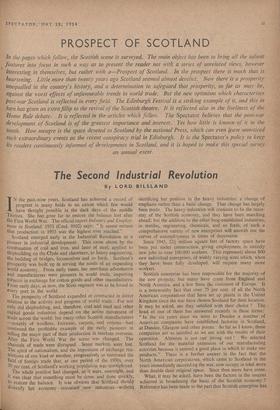PROSPECT OF SCOTLAND
In the pages which follow, the Scottish scene is surveyed. The main object has been to bring all the salient features into focus in such a way as to present the reader not with a series of unrelated views, however Interesting in themselves, but rather with a—Prospect of Scotland. In the prospect there is much that is heartening. Little more than twenty years ago Scotland seemed almost derelict. Now there is a prosperity Unequalled in the country's history, and a determination to safeguard that prosperity, .so far as may be, against the worst effects of unfavourable trends in world trade. But the new optimism which characterises Post-war Scotland is reflected in every field. The Edinburgh Festival is a striking example of it, and this in turn has given an extra fillip to the revival of the Scottish theatre. It is reflected also in the liveliness of the Rome Rule debate. It is reflected in the articles which follow. The Spectator believes that the post-war development of Scotland is of the greatest importance and interest. Yet how little is known of it in the south. How meagre is the space devoted to Scotland by the national Press, which can even leave unnoticed such extraordinary events as the recent conspiracy trial in Edinburgh. It is the Spectator's policy to keep its readers continuously informed of developments in Scotland, and it is hoped to make this special survey
an annual event.
The Second Industrial Revolution
. Scotland emerged early in the Industrial Revolution as a Pioneer in industrial development. This came about by the combination of coal and iron, and later of steel, applied to ?shipbuilding on the Clyde and elsewhere, to heavy engineering, the building of bridges, locomotives and so forth. Scotland's Prosperity was built up in serving the needs of an expanding World economy. From early times, her merchant adventurers and manufacturers were pioneers in world trade, importing tobacco in exchange for cotton goods and other manufactures. From early days, as now, the Soots engineer was to be found in every port in the world.
The prosperity of Scotland expanded or contracted in direct relation_ to the activity and progress of world trade. For not Only did shipbuilding, and, therefore, coal and steel and other capital goods industries depend on the active movement of trade across the world; but many other Scottish manufacturers --notably of woollens, knitwear, carpets, and cottons--had continued the profitable example of the early pioneers in selling the major part of their production in markets overseas. After the First World War the scene was changed. The Channels of trade were disrupted. Some markets were lost. The spirit of nationalism, and the imposition of exchange res- trictions of one kind or another, progressively so narrowed the field of foreign trade that, at one period of the 1930s, over 30 per cent. of Scotland's working population was unemployed. . The whole position had changed, as it were, overnight, and It was clear that something must be done, and done quickly, to restore the balance. It was obvious that Scotland should diversify her economy—introduce . new industries—without sacrificing her position in the heavy industries: a change of emphasis rather than a basic change. That change has largely been made. The heavy industries will continue to be the main- stay of the Scottish economy, and they have been marching ahead; but the addition to the other long-established industries, in textiles, engineering, chemicals, and so forth, of such a comprehensive variety of new enterprises will smooth out the curves of unemployment in times of depression.
Since 1945, 22i million square feet of factory space have been put under construction, giving employment in entirely new jobs to over 100,000 workers. This represents about 800 new individual enterprises, of widely varying sizes which, when they have been fully developed, will require many more workers. played. Scottish labour has played an equal part; it has proved reliable, adaptable, and hard working, and has won a reputation in the lighter trades as high as that it has always held in heavy industry. Further, the central belt of Scotland has been rzoved to be a good location from which to serve not only our compact home market of fifty million people but the wide sterling area, still the largest trading area in the world. The Clyde, on account of its geographical location and the facilities it offered, was enabled to carry about half the trans-ocean traffic of the United Kingdom during the war, and today, with other Scottish ports, provides an excellent service to sustain world-wide trade. Communication by air, through Britain's second international airport at Prestwick, is equally well provided, both with North America and the continent of Europe.
A contributing factor of importance in the industrial development of recent years is the high standard of technolo- gical education in Scotland; the undergraduates in technology today represent no fewer than 25 per cent, of the total figure for Great Britain, although, as has been said, Scotland's popula- tion is only 10 per cent. of that of the whole country. The fact that the recently established United Kingdom Mechanical Engineering Research Laboratory was located at East Kilbride, near Glasgow, will promote further research-mindedness, so essential today. In reviewing the progress of recent years mention must be made of two other important factors—the Success of the distribution of industry' policy of successive governments since the war, and, not least, the spirit of Scot- The crisis of the 1930s evoked the action of a number of prominent Scotsmen, who, under the leadership of the Earl of Elgin and the late Sir James Lithgow, formed the Scottish Development Council. This valuable pioneer body, which had the support of industry, the trade unions, and the local authori- ties, did much effective work in enquiring info the causes of the difficulties of the time, and in pointing to the remedies. The experience which it gained was invaluable to its successor, the Scottish Council of today.



































































 Previous page
Previous page